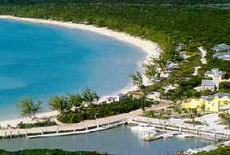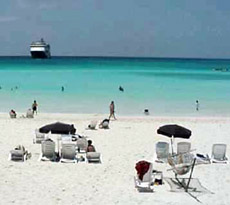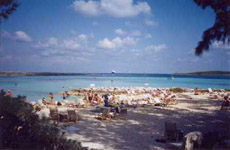index
What's your problem?
click on images for full-size:





Half Moon Cay beach (Photo by Alan Walker used with permission of SeaLetter Cruise Magazine)

Half Moon Cay beach (Photo by Alan Walker used with permission of SeaLetter Cruise Magazine)

CocoCay in the Bahamas (Photo by Bill and Val Atkinson used with permission of SeaLetter Cruise Magazine)

Labadee beach, on a peninsula on the north shore of Haiti (Photo by Doug Terhune used with permission of SeaLetter Cruise Magazine)
It is not so easy to decide what bothers us about the fantasy islands, and whether it should. The islands are designed to fit pre-existent fantasies. But consider that there are artificial fossil whale bones buried on one of these islands so that children can uncover them as part of a paleontology activities program. Generalize that: the islands, like many theme parks, are toys. Some toys are educational, some just fun, some both. We may be bothered by artificial fossils on an artificially pristine beach, but we are not bothered by giving a child toy medical tools, or toy cars, or dolls, or a playhouse. We encourage kids to play at being doctors or clerks or builders. We encourage them to watch highly produced educational TV shows full of fictions. So now there are fake fossils, and as they play at being paleontologists; their parents play at being rich folk in a tropical paradise; what's the difference? Younger people these days are more tolerant of simulation and have less craving for authenticity. Simulations and fakes can be fun. They can be educational. When toys give information we think that this is an acceptable process. Media-savvy people -- and kids -- realize that some of what they are experiencing belongs to the medium and some is information they can use. They learn how to project from the experience, how to read the analogies. We do this all the time. We don't expect toys to be exactly like the real thing. Why not then cheerfully accept the islands' with their sanitized tastes of culture and their fake fossils? For one thing, the degree of scripting seems excessive. Yet we do this with children all the time: we plan experiences with predetermined outcomes, so that they will learn or enjoy. We adults want more leeway for ourselves, but we accept tightly scripted places and times when we need instruction or when we are after pre-planned thrills. So are we objecting that on the islands the tourists are being treated like children without being told so? Maybe, but I think that what we really object to is not the theming but the simplicity of the content. You can't reject the fantasy islands just on the basis of their pre-planned artificiality; toys show that we do not reject all such artificiality. It all depends on the complexity of the content, and whether there is enough acknowledgment of the process of being within a fantasy.